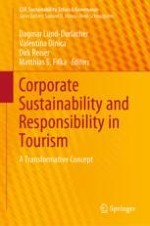2019 | OriginalPaper | Buchkapitel
13. Corporate Sustainability and Responsibility in Ecotourism: Entrepreneurial Motivation Enacted Through Sustainability Objectives
verfasst von : Christopher Swan, Damian Morgan
Erschienen in: Corporate Sustainability and Responsibility in Tourism
Aktivieren Sie unsere intelligente Suche, um passende Fachinhalte oder Patente zu finden.
Wählen Sie Textabschnitte aus um mit Künstlicher Intelligenz passenden Patente zu finden. powered by
Markieren Sie Textabschnitte, um KI-gestützt weitere passende Inhalte zu finden. powered by
